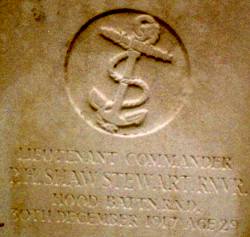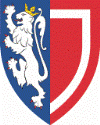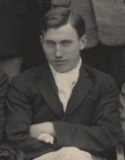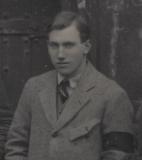Balliol College Archives & Manuscripts |
Back to: HOME > Past Members > Remarkable alumni
Patrick Houston Shaw-Stewart (1888-1917), War Poet
Patrick Houston Shaw-Stewart was born on 17 August 1888 at Aberartro Llanenddwyn on the Merioneth coast, second son of retired Royal Engineers Major-General John Heron Maxwell Shaw-Stewart (1831-1908) and Mary Catherine Bedingfield (ca. 1847-1909), only daughter of Colonel George Chancellor Collyer (1814-1897), also of the Royal Engineers, whom he married in 1871. His elder brother Colonel Basil Heron Shaw-Stewart CMG DSO (1877-1939), and two sisters who died unmarried, survived him.
At both Eton (1901-1906) and Balliol College Oxford (1907-1910) he was a foundation scholar, and he swept the board of available academic prizes - the Reynolds and Newcastle scholarships at Eton and the Ireland, Craven, Hertford and Eldon Law scholarships while at Balliol, as well as Firsts in Honour Moderations and Greats. His contemporaries thought his pointed nose, pallid freckled complexion and red hair unattractive, but he was by common consent the intellectual star of his circle: he was President of the Annandale Society and prominent in many of the other Balliol debating and dining societies which flourished in his time. His closest friends at Balliol were all Etonians: Ronald Knox*, later his biographer; LE Jones* who also wrote about him; and a doomed group which was exuberant beyond the patience of the dons - Julian Grenfell*, Charles Alfred Lister (1887-1915), and Edward William Horner (1888-1917). Following Lister's rustication in 1908 for ridiculing the Junior Dean of Trinity College, there was an elaborate mock funeral at which Shaw-Stewart preached on the text "I wist not, brethren, that he was the high priest".
 In the autumn after Greats, he was elected a fellow of All Souls College, and he was entered as a student of the Inner Temple, but he had already accepted a job with Barings Bank. By 1913 he was a managing director. A member of the "corrupt coterie" of young aristocratic socialites which was centred on Diana Manners (Lady Diana Cooper*), he corresponded profusely and intimately with her from 1908 until a few days before his death. He was in America on bank business in 1914, but returned to England not long before war was declared. He was commissioned as a Sub-Lt in the RNVR in September 1914, joining the Hood Battalion of the RND in November. When they sailed on the Grantully Castle for the Mediterranean on 22 February 1915, he took his Herodotus as a guidebook. His mess companions included FS Kelly*, Bernard Freyberg*, and Rupert Brooke*. When they buried Brooke among the olive trees of Skyros on 23 April 1915, Shaw-Stewart commanded the firing party. After Gallipoli, where he grew a striking red beard and earned the Legion of Honour for liaison work with the French, he was attached to the French forces in Salonika through 1916, for which he was awarded the Croix de Guerre. Although appointed a staff officer (GSO.3), he badgered the War Office to be allowed to see real action, and rejoined the Hood Battalion in France in May 1917. He was killed on 30 December 1917 as its temporary commanding officer in the rank of Lt-Cdr, and was buried on 6 January 1918 in the British extension to the communal cemetery at Metz-en-Couture.
In the autumn after Greats, he was elected a fellow of All Souls College, and he was entered as a student of the Inner Temple, but he had already accepted a job with Barings Bank. By 1913 he was a managing director. A member of the "corrupt coterie" of young aristocratic socialites which was centred on Diana Manners (Lady Diana Cooper*), he corresponded profusely and intimately with her from 1908 until a few days before his death. He was in America on bank business in 1914, but returned to England not long before war was declared. He was commissioned as a Sub-Lt in the RNVR in September 1914, joining the Hood Battalion of the RND in November. When they sailed on the Grantully Castle for the Mediterranean on 22 February 1915, he took his Herodotus as a guidebook. His mess companions included FS Kelly*, Bernard Freyberg*, and Rupert Brooke*. When they buried Brooke among the olive trees of Skyros on 23 April 1915, Shaw-Stewart commanded the firing party. After Gallipoli, where he grew a striking red beard and earned the Legion of Honour for liaison work with the French, he was attached to the French forces in Salonika through 1916, for which he was awarded the Croix de Guerre. Although appointed a staff officer (GSO.3), he badgered the War Office to be allowed to see real action, and rejoined the Hood Battalion in France in May 1917. He was killed on 30 December 1917 as its temporary commanding officer in the rank of Lt-Cdr, and was buried on 6 January 1918 in the British extension to the communal cemetery at Metz-en-Couture.
Characterised as a "war poet" in many places, this rests on a single poem which was unknown in his lifetime, albeit a memorable one which has been printed many times since. Written in a rest period during the Dardanelles campaign, it is, like his correspondence, heavily laced with allusions to Greek epic literature.
I saw a man this morning Fair broke the day this morning But other shells are waiting O hell of ships and cities, Achilles came to Troyland Was it so hard, Achilles, I will go back this morning |
Please note: Balliol does not have a Shaw-Stewart archive. Balliol holds one box of material about PHSS, consisting almost entirely of Dr John Jones' research notes. He has kindly made this material open to other researchers; it includes numerous photocopies of documents from other collections, but no original documents from Balliol. All the substantive information in college administrative records has been published in the Balliol College Register. Balliol holds several photographs of PHSS:
|
PHOT 19.30 Dervorguilla Society 1907 |
PHOT 19.31 Dervorguilla Society 1908 |
PHOT 19.32 Dervorguilla Society 1909 |
PHOT 31.33 2nd Torpid 1909 |
Manuscript Sources
British Library Add 70704-70720. Correspondence of PH Shaw-Stewart and Lady Diana Cooper [née Manners].
Eton College Library. A copy of A Shropshire lad, in which Shaw-Stewart wrote his poem "I met a man this morning …….".
Hertfordshire Archives and Local Studies, Grenfell Papers D/ERv C2491/1-91. PH Shaw-Stewart, letters to Lady Desborough [Ethel, alias 'Ettie', née Fane].
Princeton University Library, Richard Halliburton Papers, ref CO247, Box 42/49. PH Shaw-Stewart to E Marsh, 24 May 1915, describing Rupert Brooke's last illness and death etc.
Printed Sources
Lady Cynthia Asquith, Diaries 1915-18 (1968).
Balliol College War Memorial Book (privately printed 1924), vol II; Shaw-Stewart's entry has a portrait photograph.
D Cooper, The rainbow comes and goes (1958).
P Freyberg, Bernard Freyberg, VC. Soldier of two nations (1991).
M Jebb, Patrick Shaw Stewart - An Edwardian Meteor (2010).
J Jollife, Raymond Asquith. Life and letters (1980).
LE Jones, An Edwardian youth (1956).
N Jones, Rupert Brooke (1999).
RA Knox, Patrick Shaw-Stewart (1920).
A Lambert, Unquiet Souls. The Indian summer of the British aristocracy (1984).
J Mackenzie, The Children of the Souls (1986). This valuable source, which contains much detail concerning Shaw-Stewart, and cites letters which remain in private hands, was pointed out by Mr D. Hillage.
N Mosley, Julian Grenfell. His life and the times of his death 1888-1915 (1976).
The Oxford Dictionary of National Biography: Shaw-Stewart has no entry but many of his associates do, including those with an asterisk* in the above notes.
C Page, Command in the Royal Naval Division: A military biography of Brigadier General AM Asquith DSO (1999).
EB Poulton, The life of Ronald Poulton (1919).
Lord Ribblesdale, Charles Lister: Letters and recollections with a memoir by his father (1917).
L Sellers, The Hood Battalion. Royal Naval Division: Antwerp, Gallipoli, France 1914-1918 (1995).
[BH Shaw-Stewart] Patrick Shaw Stewart 1888-1917 (privately printed 1940), with a portrait drawing [the original of which is in All Souls College].
V Tree, Castles in the air. The story of my singing days (1926).
E Waugh, Ronald Knox (1959).
P Ziegler, Diana Cooper (1981).
P Ziegler, The sixth great power: Barings 1762-1929 (1988).
You do not need to request permission to download or print one copy of any of the images on these pages for your personal private study or research purposes.
You do need to request permission in writing to use any of these images for any publication in any format, including any use on a website.
There is no charge for Archive enquiries, but donations for Archive purposes are always appreciated.
| Updated 11.viii.14
|
Balliol College All rights reserved © 2026 |




